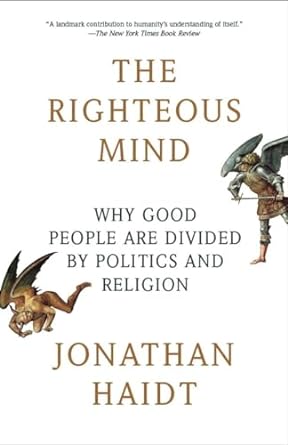More on this book
Community
Kindle Notes & Highlights
Read between
July 23 - July 23, 2023
People bind themselves into political teams that share moral narratives. Once they accept a particular narrative, they become blind to alternative moral worlds.
And if you want your kids to learn about the social world, let them play with other kids and resolve disputes; don’t lecture them about the Ten Commandments.
Carnegie was in fact a brilliant moral psychologist who grasped one of the deepest truths about conflict. He used a quotation from Henry Ford to express it: “If there is any one secret of success it lies in the ability to get the other person’s point of view and see things from their angle as well as your own.”50
When we’re trying to decide what we think about something, we look inward, at how we’re feeling. If I’m feeling good, I must like it, and if I’m feeling anything unpleasant, that must mean I don’t like it.
when slackers and cheaters go unpunished, everything falls apart.
Accountability increases exploratory thought only when three conditions apply: (1) decision makers learn before forming any opinion that they will be accountable to an audience, (2) the audience’s views are unknown, and (3) they believe the audience is well informed and interested in accuracy. When all three conditions apply, people do their darnedest to figure out the truth, because that’s what the audience wants to hear.
Our moral thinking is much more like a politician searching for votes than a scientist searching for truth.
As they put it, “skilled arguers … are not after the truth but after arguments supporting their views.”
Reasoning can take us to almost any conclusion we want to reach, because we ask “Can I believe it?” when we want to believe something, but “Must I believe it?” when we don’t want to believe. The answer is almost always yes to the first question and no to the second.
Everyone cares about fairness, but there are two major kinds. On the left, fairness often implies equality, but on the right it means proportionality—people should be rewarded in proportion to what they contribute, even if that guarantees unequal outcomes.
The very act of congregating is an exceptionally powerful stimulant. Once the individuals are gathered together, a sort of electricity is generated from their closeness and quickly launches them to an extraordinary height of exaltation.13
Focusing on leadership alone is like trying to understand clapping by studying only the left hand. They point out that leadership is not even the more interesting hand; it’s no puzzle to understand why people want to lead. The real puzzle is why people are willing to follow.
Moral systems are interlocking sets of values, virtues, norms, practices, identities, institutions, technologies, and evolved psychological mechanisms that work together to suppress or regulate self-interest and make cooperative societies possible.66
Corporations are obligated to maximize profit for shareholders, and that means looking for any and all opportunities to lower costs, including passing on costs on to others (when legal) in the form of externalities.
described the changes that began in 1995. Newt Gingrich, the new speaker of the House of Representatives, encouraged the large group of incoming Republican congressmen to leave their families in their home districts rather than moving their spouses and children to Washington. Before 1995, congressmen from both parties attended many of the same social events on weekends; their spouses became friends; their children played on the same sports teams. But nowadays most congressmen fly to Washington on Monday night, huddle with their teammates and do battle for three days, and then fly home on
...more
In 1976, only 27 percent of Americans lived in “landslide counties”—counties that voted either Democratic or Republican by a margin of 20 percent or more. But the number has risen steadily; in 2008, 48 percent of Americans lived in a landslide county.
Morality binds and blinds. It binds us into ideological teams that fight each other as though the fate of the world depended on our side winning each battle. It blinds us to the fact that each team is composed of good people who have something important to say.


